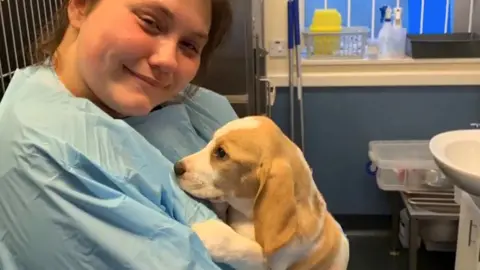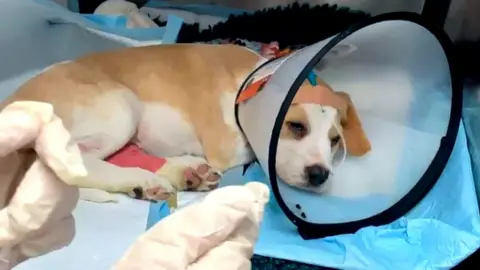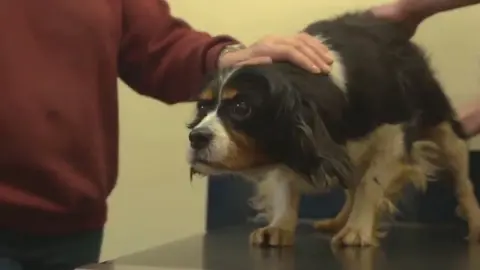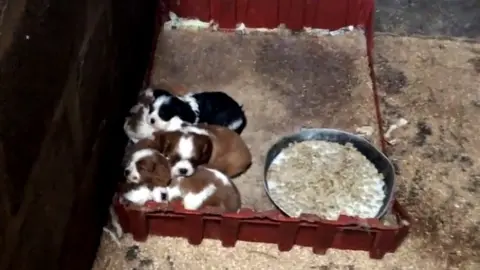Welsh vets 'failing' dogs at puppy farms
There are calls for vets to be investigated over their involvement in the Welsh puppy farm industry.
Over 12 months, BBC Wales Investigates found "filthy" conditions at breeding sites licensed - and approved - by councils.
As part of the licensing process breeders pay vets to check dogs to decide if they're "fit to breed".
But an expert panel told BBC Wales some vets' standards had "slipped" and they were "part of" a "broken system".
It claimed one practice - Aeron Vets - did not appear to question the environment dogs were being kept in, despite long lists of animals with serious health problems.
It also claimed some animals at two licensed sites were found with mange and intensely itchy skin conditions, and others were found with cysts, matted fur and eye problems, but the breeders were still re-licensed by the council, and vets failed to raise any concern about the sites in their official reports.
Aeron Vets said it had to respect client confidentiality, but that in any situation where it considered animal welfare was "compromised" it would "take whatever steps might be within its powers to address the matter".
The BBC showed footage from all the puppy farms it visited to a panel of vets with more than 100 years' experience between them.
Paula Boyden, veterinary director at The Dogs Trust, said: "It's hugely saddening and really quite upsetting to see the number of dogs that I've seen kept in those sorts of environments, and that's their life.
"It's just so wrong on so many levels.
"The system is definitely broken and vets are absolutely an integral part of it.
"We as a profession have a part to play."
Another senior vet - Mike Jessop - who is brought in by local authorities to advise on welfare issues, told the BBC there were clear examples where some professional colleagues have been "found wanting".
He said he would be making a referral to the Royal College of Veterinary Surgeons regarding the evidence in the programme.
The Welsh Government is considering bringing in Lucy's Law, following England's example.
 Danielle Foley
Danielle FoleyWhile it would ban the sale of puppies by third parties, the panel of vets said there were already issues with enforcing existing laws.
One owner, Danielle Foley from Swansea, described on the programme how she found a beagle puppy - she called it Winston - being sold on the internet by a licensed breeder in Carmarthenshire.
"He said he was a reputable breeder with his own website. It was all a perfect picture," said Danielle, who was shown the dog, on his own, in a quiet room near the entrance to the farm.
But the programme found she wasn't seeing the whole story.
Away from public view at the breeder's farm near Kidwelly, there was a shed full of dogs and puppies.
An inspection report from earlier this year showed the farm had problems with waste, record keeping and the highly infectious disease Parvovirus.
It also said the owner had kicked a dog while inspectors were present, but was still re-issued with a licence.
 Danielle Foley
Danielle FoleyWithin 24 hours of Danielle getting Winston home, he became weak and was taken to the vets, where he tested positive for Parvo. Within days, he had to be put down.
Danielle said the man who sold Winston said the dog had been vaccinated against Parvovirus, and that he had vaccinated Winston himself.
She said he also offered her antibiotics when she contacted him to say the pup was ill.
This is against the rules.
The Royal College of Veterinary Surgeons said a vet should always check a puppy to ensure it is fit for vaccination.
The registered veterinary practice for the breeder - Towy Vets in Carmarthen - said that, in light of the allegations, it was investigating.
Carmarthenshire County Council, which licensed the breeder who sold Winston, said it would not hesitate to prosecute anyone who breaks the rules.
In a statement, a solicitor for Alun Douch, the breeder who sold Winston, said any "reference to any cruelty to any animal is denied categorically" and challenges in relation to the spread of possible disease were "addressed" with professionals.
He added the breeder had an "excellent" reputation and "has always strived in a constructive partnership with the regulator to ensure the highest industry standards".

Selling dogs is big business in Wales.
BBC research found there were 260 licensed dog breeders in the country as of August 2019, producing an estimated 24,000 puppies every year.
According to expert vets, the dogs are conservatively worth more than £12m.
Welsh Government regulations mean anyone who breeds three litters or more per year must be licensed by their local council.
The investigation visited many approved sites and found dogs suffering from infections and kept in poor conditions with little access to exercise.
In annual health checks seen by the BBC, vets also recorded significant numbers of dogs with serious health conditions at approved sites, but breeders were allowed to continue operating, year after year.

The BBC team were given a former breeding dog at a puppy farm near Llandysul, Ceredigion earlier this year.
The dog came with no name, paperwork or medical history.
A rescue charity took her and named her Olwyn.
When she was seen by their vet she was found to have just given birth and had a dead puppy still inside her, leading to emergency surgery.
David Jones, who gave the dog to a reporter, had already been warned by Ceredigion council to take better care of his dogs, although the council regularly renewed his breeding licence.
Mr Jones said his dog breeding business was regulated by Ceredigion County Council to "ensure the highest industry standards".
In a statement he said: "Whilst reference is made to deficiencies in a recent inspection report, this should not be considered in isolation as it was part of a dialogue between the partnership and regulator to ensure compliance and professional development.
"Unfortunately dogs occasionally become unwell due to matters which are not diagnosed or would not be within their [the partnership's] knowledge.
"This can occur at any time and without any negligence on behalf of the partnership."
Ceredigion Council said improvements had been made by Mr Jones, and they had to strike a balance between enforcement and education.
BBC Wales Investigates Inside the UK's Puppy Farm Capital on Monday 30 September at 20:30 BST on BBC One Wales, and on the BBC iPlayer.
